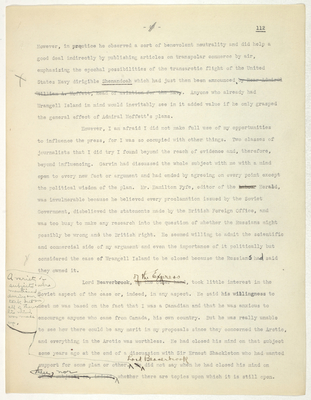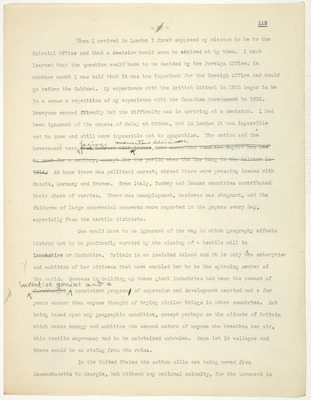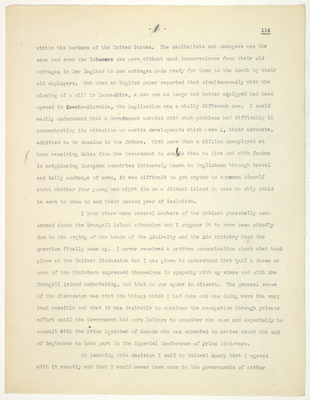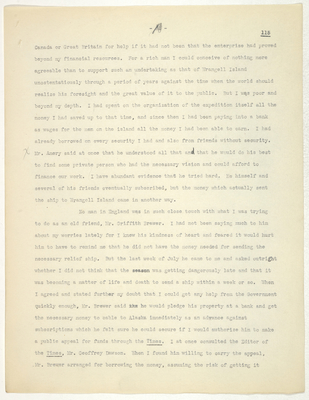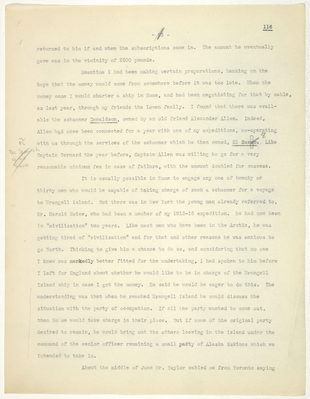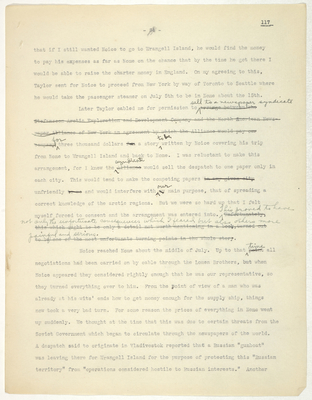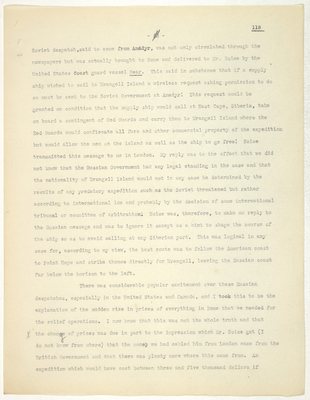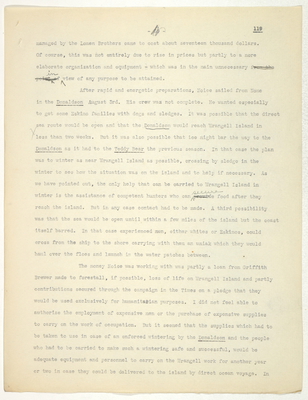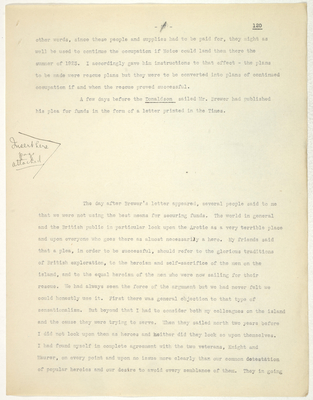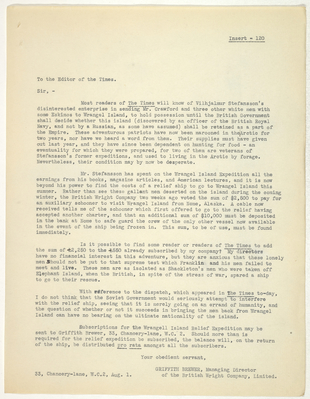Pages That Need Review
stefansson-wrangel-09-28
stefansson-wrangel-09-28-009
112
- 49 -
However, in practice he observed a sort of benevolent neutrality and did help a good deal indirectly by publishing articles on transpolar commerce by air, emphasizing the epochal possibilities of the transarctic flight of the United X States Navy dirigible Shenandoah which had just then been announced. by Rear Admiral William A. Moffett, head of aviation for the Navy. Anyone who already had Wrangell Island in mind would inevitably see in it added value if he only grasped the general effect of Admiral Moffett's plans.
However, I am afraid I did not make full use of my opportunities to influence the press, for I was so occupied with other things. Two classes of journalists that I did try I found beyond the reach of evidence and, therefore, beyond influencing. Garvin had discussed the whole subject with me with a mind open to every new fact or argument and had ended by agreeing on every point except the political wisdom of the plan. Mr. Hamilton Fyfe, editor of the Labour Herald, was invulnerable because he believed every proclamation issued by the Soviet Government, disbelieved the statements made by the British Foreign Office, and was too busy to make any research into the question of whether the Russians might possibly be wrong and the British right. He seemed willing to admit the scientific and commercial side of my argument and even the importance of it politically but X considered the case of Wrangell Island to be closed because the Russians had said they owned it.
Lord Beaverbrook, on the other hand of the Express, took little interest in the Soviet aspect of the case or, indeed, in any aspect. He said his willingness to meet me was based on the fact that I was a Canadian and that he was anxious to encourage anyone who came from Canada, his own country. But he was really unable to see how there could be any merit in my proposals since they concerned the Arctic, and everything in the Arctic was worthless. He had closed his mind on that subject some years ago at the end of a discussion with Sir Ernest Shackleton who had wanted support for some plan or other. A variety of subjects were mentioned during our talk but on all of them his mind was made up. He Lord Beaverbrook did not say when he had closed his mind on other subjects or, indeed, these, nor whether there are topics upon which it is still open.
stefansson-wrangel-09-28-010
113
- 50 -
When I arrived in London I first supposed my mission to be to the Colonial Office and that a decision would soon be arrived at by them. I next learned that the question would have to be decided by the Foreign Office; in another month I was told that it was too important for the Foreign Office and would go before the Cabinet. My experience with the British Cabinet in 1923 began to be in a sense a repetition of my experience with the Canadian Government in 1922. Everyone seemed friendly but the difficulty was in arriving at a decision. I had been ignorant of the causes of delay at Ottawa, but in London it was impossible not to know and still more impossible not to sympathize. The nation and the Government were facing momentous decisions. face to face with issues. more momentous than the Empire has had to meet for a century, except for the period when the War hung in the balance in 1914. At home there was political unrest; abroad there were pressing issues with Russia, Germany and France. Even Italy, Turkey and lesser countries contributed their share of worries. There was unemployment, business was stagnant, and the failures of large commercial concerns were reported in the papers every day, especially from the textile districts.
One would have to be ignorant of the way in which geography affects history not to be profoundly worried by the closing of a textile mill in Lancashire or Yorkshire. Britain is an isolated island and it is only the enterprise X and ambition of her citizens that have enabled her to be the spinning center of the world. Success in building up these giant industries had been the reward of forethought inventive genius and a consistent programs of expansion and development carried out a few years sooner than anyone thought of trying similar things in other countries. Not being based upon any geographic condition, except perhaps on the climate of Britain which makes energy and ambition the second nature of anyone who breathes her air, this textile supremacy had to be maintained unbroken. Once let it collapse and there could be no rising from the ruins.
In the United States the cotton mills are being moved from Massachusetts to Georgia, but without any national calamity, for the movement is
stefansson-wrangel-09-28-011
114
- 51 -
within the borders of the United States. The capitalists and managers are the same and even the laborers can move without much inconvenience from their old cottages in New England to new cottages made ready for them in the South by their old employers. But when an English paper reported that simultaneously with the closing of a mill in Lancashire, a new one as large and better equipped had been opened in Czecho-Slovakia, the implication was a wholly different one. I could easily understand that a Government worried with such problems had difficulty in concentrating its attention on arctic developments which even I, their advocate, admitted to be decades in the future. With more than a million unemployed at X home receiving doles from the Government to enable them to live and with famine in neighboring European countries intimately known to Englishmen through travel and daily exchange of news, it was difficult to get anyone to concern himself about whether four young men might die on a distant island in case no ship could be sent to them to end their second year of isolation.
I know there were several members of the Cabinet personally concerned about the Wrangell Island situation but I suppose it to have been chiefly due to the urging of the heads of the Admiralty and the Air Ministry that the question finally came up. I never received a written communication about what took place at the Cabinet discussion but I was given to understand that half a dozen or more of the Ministers expressed themselves in sympathy with my views and with the Wrangell Island undertaking, and that no one spoke in dissent. The general sense of the discussion was that the things which I had done and was doing were the very best possible and that it was desirable to continue the occupation through private effort until the Government had more leisure to consider the case and especially to consult with the Prime Minister of Canada who was expected to arrive about the end of September to take part in the Imperial Conference of Prime Ministers.
On learning this decision I said to Colonel Amery that I agreed with it exactly and that I would never have come to the governments of either
stefansson-wrangel-09-28-012
115
- 52 -
Canada or Great Britain for help if it had not been that the enterprise had proved beyond my financial resources. For a rich man I could conceive of nothing more agreeable than to support such an undertaking as that of Wrangell Island unostentatiously through a period of years against the time when the world should realize his foresight and the great value of it to the public. But I was poor and beyond my depth. I had spent on the organization of the expedition itself all the money I had saved up to that time, and since then I had been paying into a bank as wages for the men on the island all the money I had been able to earn. I had already borrowed on every security I had and also from friends without security. X Mr. Amery said at once that he understood all that and that he would do his best to find some private person who had the necessary vision and could afford to finance our work. I have abundant evidence that he tried hard. He himself and several of his friends eventually subscribed, but the money which actually sent the ship to Wrangell Island came in another way.
No man in England was in such close touch with what I was trying to do as an old friend, Mr. Griffith Brewer. I had not been saying much to him about my worries lately for I knew his kindness of heart and feared it would hurt him to have to remind me that he did not have the money needed for sending the necessary relief ship. But the last week of July he came to me and asked outright whether I did not think that the season was getting dangerously late and that it was becoming a matter of life and death to send a ship within a week or so. When I agreed and stated further my doubt that I could get any help from the Government quickly enough, Mr. Brewer said the he would pledge his property at a bank and get the necessary money to cable to Alaska immediately as an adyance against subscriptions which he felt sure he could secure if I would authorize him to make a public appeal for funds through the Times. I at once consulted the Editor of the Times, Mr. Geoffrey Dawson. When I found him willing to carry the appeal, Mr. Brewer arranged for borrowing the money, assuming the risk of getting it
stefansson-wrangel-09-28-013
116
- 53 -
returned to him if and when the subscriptions came in. The amount he eventually gave was in the vicinity of 2500 pounds.
Meantime I had been making certain preparations, banking on the hope that the money would come from somewhere before it was too late. When the money came I would charter a ship in Nome, and had been negotiating for that by cable, as last year, through my friends the Lomen family. I found that there was available the schooner Donaldson, owned by an old friend Alexander Allen. Indeed, Allen had once been connected for a year with one of my expeditions, co-operating [in margain: ñ The Spanish is [...]] with us through the services of the schooner which he then owned, El Sueño. Like Captain Bernard the year before, Captain Allen was willing to go for a very reasonable minimum fee in case of failure, with the amount doubled for success.
It is usually possible in Nome to engage any one of twenty or thirty men who would be capable of taking charge of such a schooner for a voyage to Wrangell Island. But there was in New York the young man already referred to, Mr. Harold Noice, who had been a member of my 1913-18 expedition. He had now been in "civilization" two years. Like most men who have been in the Arctic, he was getting tired of "civilization" and for that and other reasons he was anxious to go North. Thinking to give him a chance to do so, and considering that no one I knew was markedly better fitted for the undertaking, I had spoken to him before I left for England about whether he would like to be in charge of the Wrangell Island ship in case I got the money. He said he would be eager to do this. The understanding was that when he reached Wrangell Island he would discuss the situation with the party of occupation. If all the party wanted to come out, then Noice would take charge in their place. But if some of the original party desired to remain, he would bring out the others leaving in the island under the command of the senior officer remaining a small patty of Alaska Eskimos which we intended to take in.
About the middle of June Mr. Taylor cabled me from Toronto saying
stefansson-wrangel-09-28-014
117
- 54 -
that if I still wanted Noice to go to Wrangell Island, he would find the money to pay his expenses as far as Nome on the chance that by the time he got there I would be able to raise the charter money in England. On my agreeing to this, Taylor sent for Noice to proceed from New York by way of Toronto to Seattle where he would take the passenger steamer on July 5th to be in Nome about the 15th.
Later Taylor cabled me for permission to sell to a newspaper syndicate arrange between the Stefansson Arctic Exploration and Development Company and the North American Newspaper Alliance of New Work an agreement by which the Alliance would pay our company for three thousand dollars for a story to be written by Noice covering his trip from Nome to Wrangell Island and back to Nome. I was reluctant to make this arrangement, for I knew the syndicate Alliance would sell the despatch to one paper only in each city. This would tend to make the competing papers in any given city unfriendly to us and would interfere with our my main purpose, that of spreading a correct knowledge of the arctic regions. But we were so hard up that I felt myself forced to consent and the arrangement was entered into. This proved to have not only the unfortunate consequences which I feared but also others more painful and serious. Unfortunately, this which ought to be only a detail not worth mentioning in a book, turned out to be one of the most unfortunate turning points in the whole story.
Noice reached Nome about the middle of July. Up to that time point all negotiations had been carried on by cable through the Lomen Brothers, but when Noice appeared they considered rightly enough that he was our representative, so they turned everything over to him. From the point of view of a man who was already at his wits' ends how to get money enough for the supply ship, things now took a very bad turn. For some reason the prices of everything in Nome went up suddenly. We thought at the time that this was due to certain threats from the Soviet Government which began to circulate through the newspapers of the world. A despatch said to originate in Vladivostok reported that a Russian "gunboat” was leaving there for Wrangell Island for the purpose of protecting this "Russian territory" from "operations considered hostile to Russian interests." Another
stefansson-wrangel-09-28-015
118
- 55 -
Soviet despatch,said to come from Anadyr, was not only circulated through the newspapers but was actually brought to Nome and delivered to Mr. Noice by the United States Coast guard vessel Bear. This said in substance that if a supply ship wished to sail to Wrangell Island a wireless request asking permission to do so must be sent to the Soviet Government at Anadyr! This request would be granted on condition that the supply ship would call at East Cape, Siberia, take on board a contingent of Red Guards and carry them to Wrangell Island where the Red Guards would confiscate all furs and other commercial property of the expedition but would allow the men on the island as well as the ship to go free! Noice transmitted this message to me in London. My reply was to the effect that we did not know that the Russian Government had any legal standing in the case and that the nationality of Wrangell Island would not in any case be determined by the results of any predatory expedition such as the Soviet threatened but rather according to international law and probably by the decision of some international tribunal or committee of arbitration. Noice was, therefore, to make no reply to the Russian message and was to ignore it except as a hint to shape the course of the ship so as to avoid calling at any Siberian port. This was logical in any case for, according to my view, the best route was to follow the American coast to Point Hope and strike thence directly for Wrangell, leaving the Russian coast far below the horizon to the left.
There was considerable popular excitement over these Russian despatches, especially in the United States and Canada, and I took this to be the explanation of the sudden rise in prices of everything in Nome that we needed for the relief operations. I now know that this was not the whole truth and that X the change of prices was due in part to the impression which Mr. Noice got (I do not know from where) that the money we had cabled him from London came from the British Government and that there was plenty more where this came from. An expedition which would have cost between three and five thousand dollars if
stefansson-wrangel-09-28-016
119
- 56 -
managed by the Lomen Brothers came to cost about seventeen thousand dollars. Of course, this was not entirely due to rise in prices but partly to a more elaborate organization and equipment - which was in the main unnecessary from the point of in view of any purpose to be attained.
After rapid and energetic preparations, Noice sailed from Nome in the Donaldson August 3rd. His crew was not complete. He wanted especially to get some Eskimo families with dogs and sledges. It was possible that the direct sea route would be open and that the Donaldson would reach Wrangell Island in X less than two weeks. But it was also possible that ice might bar the way to the Donaldson as it had to the Teddy Bear the previous season. In that case the plan was to winter as near Wrangell Island as possible, crossing by sledge in the winter to see how the situation was on the island and to help if necessary. As we have pointed out, the only help that can be carried to Wrangell Island in winter is the assistance of competent hunters who can secure provide food after they reach the island. But in any case contact had to be made. A third possibility was that the sea would be open until within a few miles of the island but the coast itself barred. In that case experienced men, either whites or Eskimos, could cross from the ship to the shore carrying with them an umiak which they would haul over the floes and launch in the water patches between.
The money Noice was working with was partly a loan from Griffith Brewer made to forestall, if possible, loss of life on Wrangell Island and partly contributions secured through the campaign in the Times on a pledge that they would be used exclusively for humanitarian purposes. I did not feel able to authorize the employment of expensive men or the purchase of expensive supplies to carry on the work of occupation. But it seemed that the supplies which had to be taken to use in case of an enforced wintering by the Donaldson and the people who had to be carried to make such a wintering safe and successful, would be adequate equipment and personnel to carry on the Wrangell work for another year or two in case they could be delivered to the island by direct ocean voyage. In
stefansson-wrangel-09-28-017
120
- 57 -
other words, since these people and supplies had to be paid for, they might as well be used to continue the occupation if Noice could land them there the summer of 1923. I accordingly gave him instructions to that effect - the plans to be made were rescue plans but they were to be converted into plans of continued occupation if and when the rescue proved successful.
A few days before the Donaldson sailed Mr. Brewer had published his plea for funds in the form of a letter printed in the Times.
Insert here page attached
The day after Brewer's letter appeared, several people said to me that we were not using the best means for securing funds. The world in general and the British public in particular look upon the Arctic as a very terrible place and upon everyone who goes there as almost necessarily a hero. My friends said that a plea, in order to be successful, should refer to the glorious traditions of British exploration, to the heroism and self-sacrifice of the men on the island, and to the equal heroism of the men who were now sailing for their rescue. We had always seen the force of the argument but we had never felt we could honestly use it. First there was general objection to that type of sensationalism. But beyond that I had to consider both my colleagues on the island and the cause they were trying to serve. When they sailed north two years before I did not look upon them as heroes and neither did they look so upon themselves. I had found myself in complete agreement with the two veterans, Knight and Maurer, on every point and upon no issue more clearly than our common detestation of popular heroics and our desire to avoid every semblance of them. They in going
stefansson-wrangel-09-28-018
Insert - 120
To the Editor of the Times.
Sir, -
Most readers of The Times will know of Vilhjalmur Stefansson's disinterested enterprise in sending M. Crawford and three other white men with some Eskimos to Wrangel Island, to hold possession until the British Government shall decide whether this island (discovered by an officer of the British Royal Navy, and not by a Russian, as some have assumed) shall be retained as a part of the Empire. These adventurous patriots have now been marooned in theoretic for two years, nor have we heard a word from them. Their supplies must have given out last year, and they have since been dependent on hunting for food - an eventuality for which they were prepared, for two of them are veterans of Stefansson's former expeditions, and used to living in the Arctic by forage. Nevertheless, their condition may by now be desperate.
Mr. Stefansson has spent on the Wrangel Island Expedition all the earnings from his books, magazine articles, and American lectures, and it is now beyond his power to find the costs of a relief ship to go to Wrangel Island this summer. Rather than see these gallant men deserted on the island during the coming winter, the British Wright Company two weeks ago voted the sum of $2,500 to pay for an auxiliary schooner to visit Wrangel Island from Nome, Alaska. A cable now received tells me of the schooner which first offered to go to the relief having accepted another charter, and that an additional sum of $10,000 must be deposited in the bank at Nome to safe guard the crew of the only other vessel now available in the event of the ship being frozen in. This sum, to be of use, must be found immediately.
Is it possible to find some reader or readers of The Times to add the sum of -£2,250 to the -£550 already subscribed by my company? My directors have no financial interest in this adventure, but they are anxious that these lonely men should not be put to that supreme test which Franklin and his men failed to meet and live. These men are as isolated as Shackleton's men who were taken off Elephant Island, when the British, in spite of the stress of war, spared a ship to go to their rescue.
With reference to the dispatch, which appeared in The Times to-day, I do not think that the Soviet Government would seriously attempt to interfere with the relief ship, seeing that it is merely going on an errand of humanity, and the question of whether or not it succeeds in bringing the men back from Wrangel Island can have no bearing on the ultimate nationality of the island.
Subscriptions for the Wrangell Island Relief Expedition may be sent to Griffith Brewer, 33, Chancery-lane, W.C. 2. Should more than is required for the relief expedition be subscribed, the balance will, on the return of the ship, be distributed pro rata amongst all the subscribers.
Your obedient servant,
GRIFFITH BREWER, Managing Director 33, Chancery-lane, W.C.2, Aug. 1. of the British Wright Company, Limited.
